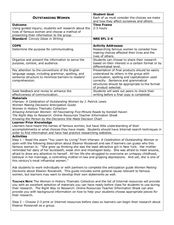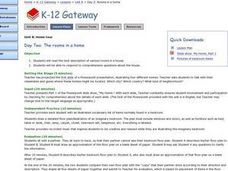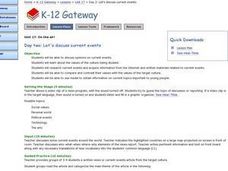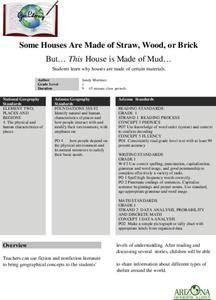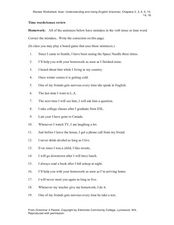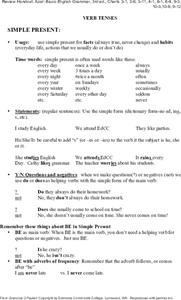Curated OER
Propaganda
How does word choice affect the reading of a text? Compare two headlines that were written about the same event. Is one biased? Discuss how word choice often reveals the author's feelings about a topic. Then look at different techniques...
Curated OER
The Iditarod Race Compared with the Movie, Iron Will
Feel the freezing rush of an Alaskan sled dog race in this reading lesson. Using research about the Iditarod Trail Sled Dog Race, seventh graders compare and contrast the depiction in the movie Iron Will. The lesson lasts for seven days...
Curated OER
Outstanding Women
Research the lives of famous women in this social studies lesson. Middle schoolers use various sources to research a famous woman and create a presentation about the accomplishments of the woman. They can find the central idea throughout...
Curated OER
What Are the Issues?
Investigate and report on three issues related to a current election. Elementary aged learners research information about specific issues, develop an opinion, and write a persuasive essay using supporting details and evidence to support...
Curated OER
Amos and Boris: Text Study
Twenty insightful questions follow a read aloud of the story, Amos and Boris by William Steig. Scholars then show what they know through completion of a cause and effect chart, reading fluency assessment, and a written explanatory or...
Curated OER
Verbs
Ninth graders define the term 'verb', differentiate between action and linking verbs, and distinguish between active and passive voice. Use this activity to examine the effect of passive and active voice in writing.
Curated OER
The "Write" Stuff: Strategies and Conventions for Imaginative Writing
Fifth graders develop and practice the steps involved in imaginative writing. They follow the steps/worksheets included and write imaginative stories of their own.
Curated OER
Hear Ye, Hear Ye: Read All About It!
Develop an online newspaper covering the Lewis and Clark Expedition. The class publishes their newspaper on the school's Web site and analyze both primary and secondary sources.
Curated OER
Family Album
Kids of all ages discover their family histories through pictures. First, flip through the PowerPoint provided (or consider making one of your own). It should show pictures of your family and have clear, easy to understand sentences that...
Curated OER
The Rooms in a Home
Enhance your foreign language students' skills to describe a house. After reading a description of rooms in a house in their target language, they work to answer corresponding questions correctly. Additionally, they view a PowerPoint...
Curated OER
Rehearsing the Fashion Show
Students edit written work about a fashion show. In this fashion show lesson plan, students write a presentation piece and works in groups of 4,6, or 8 to edit what they have written. Students rehearse by pair sharing and give their...
Curated OER
Let's Discuss Current Events
Investigate articles from the daily news and share opinions with classmates. Using current events, learners view a news program without sound and predict what news is being discussed by analyzing the visuals. Then they read news articles...
Curated OER
When Is a Noun a Verb? Examining Double Duty Words
The New York Times' Learning Network provides great lessons! This one uses articles from the paper to help readers understand homonyms like mail (verb and noun). It also includes an exercise in reading informational text. Links to the...
Curated OER
When is a Noun a Verb? Examining Double Duty Words
Act and act, address and address...there are so many words in our dictionary that can function as nouns or verbs. Start this lesson by having your class list as many as they possibly can. When an adequate list presents itself, have your...
Houghton Mifflin Harcourt
Elaboration, Revision, and Proofreading
Designed to help writers strengthen their elaboration, revision, and proofreading skills, this 48-page workbook is packed with information about and exercises in personal, narrative, persuasive, and report writing.
Curated OER
Some Houses Are Made of Straw, Wood, or Brick: But... This House is Made of Mud...
First graders read and discuss several stories. They share information about different types of shelter around the world. They explain that lifestyles and shelter depend very much on where people live and how they use the resources...
Curated OER
Time Words/Tenses Review
Focus on correct verb usage with your English language learners. There are 42 sentences listed; can your class correct them? The sentences are short, and the major errors are in verb tense.
Curated OER
The City Life or the country Life: conventions: Comparative and Superlative Forms of Adjectives and Adverbs
Reinforce knowledge of adjectives and adverbs by game playing. To better understand English conventions young writers, use flashcards to identify the base word and its comparative or superlative form.
Curated OER
Verb Tenses
In these verb tenses worksheets, students read about the forms of verb tenses, study examples of the tenses, and answer questions using the tenses.
Curated OER
Adjectives Ending --ible and --able
It is difficult for students to remember when to use the -ible or -able word endings. This 20 question quiz provides a review of this concept using commonly misspelled words.
Curated OER
Noun Book
Seventh graders create a book about the different types of nouns. In this noun book lesson, 7th graders discuss and define plurals, possessives, and proper nouns. Students then make a book or PowerPoint presentation containing examples...
Curated OER
Principal Parts of Verbs
In this parts of verbs worksheet, students review the principal parts of verbs: present, present participle, past, and past participle. Students then underline the main verb in each sentence and write present, present participle, past,...
Curated OER
Verbs
In this verb usage worksheet, students enhance their understanding of verbs by selecting a verb from the word bank to complete the sentences.
Curated OER
Personal Pronouns
In this language arts activity, students focus on the correct usage of personal pronouns. Students respond to five fill in the blank statements choosing the correct pronoun for each.




